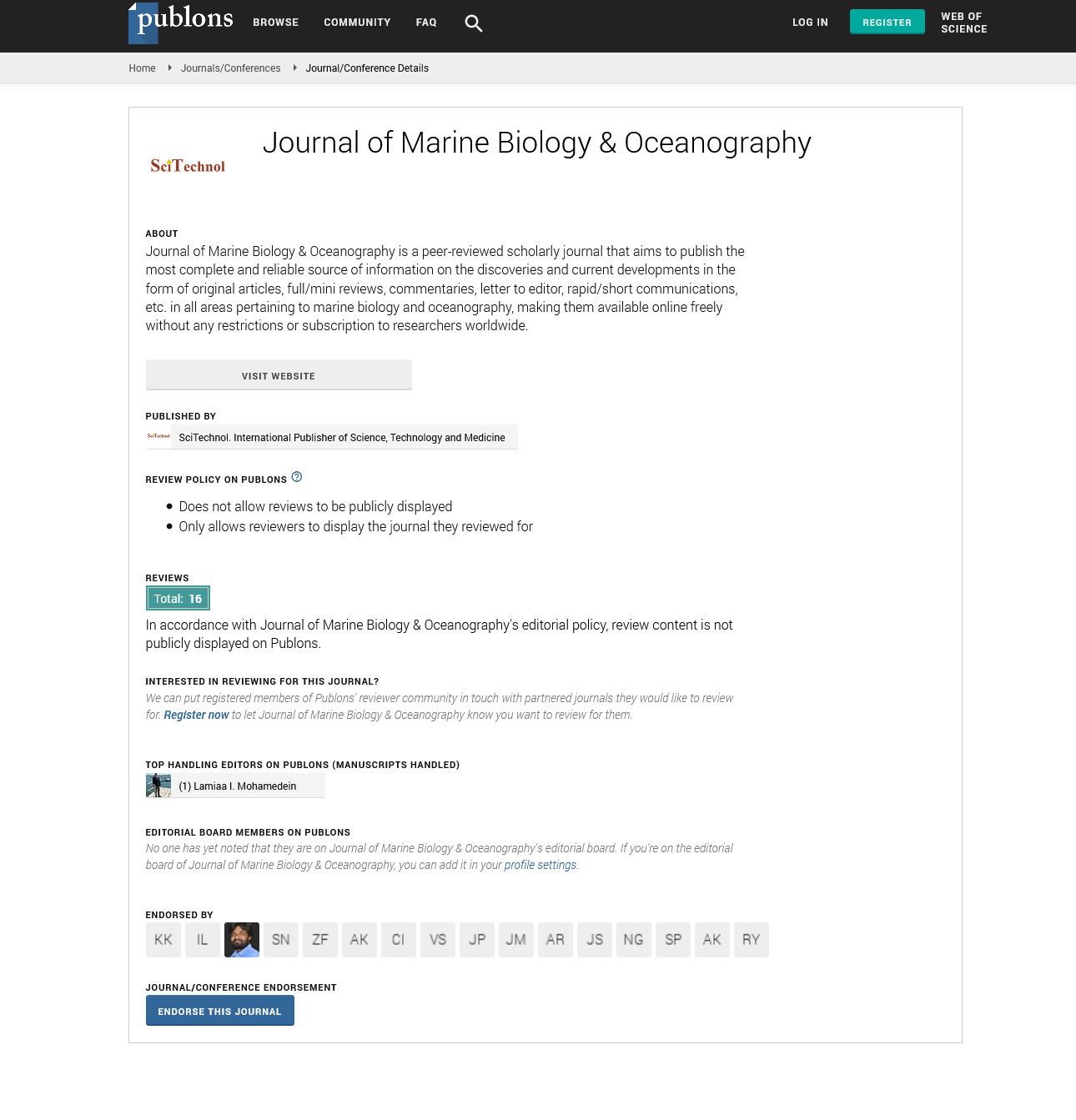Opinion Article, J Mar Biol Oceanogr Vol: 12 Issue: 3
Advancing the Knowledge of Climate: Methods and Innovations in Climatology
Duan Albenio*
1Department of Physical Geography, Lund University, Lund, Sweden
*Corresponding Author: Duan Albenio,
Department of Physical Geography, Lund University, Lund, Sweden
E-mail: duan_albenio@lu44.se
Received date: 22 May, 2023, Manuscript No. JMBO-23-105093;
Editor assigned date: 25 May, 2023, PreQC No. JMBO-23-105093 (PQ);
Reviewed date: 08 June, 2023, QC No. JMBO-23-105093;
Revised date: 15 June, 2023, Manuscript No. JMBO-23-105093 (R);
Published date: 22 June, 2023, DOI: 10.4172/2324-8661.1000269
Citation: Albenio D (2023) Advancing the Knowledge of Climate: Methods and Innovations in Climatologye. J Mar Biol Oceanogr 12:3.
Description
Climatology, the study of Earth's climate system, has seen significant advancements in the recent years due to innovative methods and technologies. Climate analysts are continuously developing and refining techniques to understand the complex mechanisms driving climate patterns and to make more accurate projections related to climate change. Climate models are at the forefront of climatology studies, providing a powerful tool to simulate the behavior of the Earth's climate system. These models incorporate various physical, chemical, and biological processes to represent interactions between the atmosphere, oceans, land surfaces, and ice. By inputting data such as greenhouse gas concentrations and solar radiation, experts can generate simulations that replicate past climate conditions and make projections for the future.
Advancements in climate modeling have led to improved spatial resolution, enabling analysts to simulate climate dynamics at regional scales. Additionally, the inclusion of more detailed representations of atmospheric and oceanic processes has enhanced the accuracy and reliability of climate projections. These models serve as invaluable tools for understanding climate variability, projecting future climate scenarios, and assessing the impacts of human activities on the Earth's climate system.
Remote sensing plays an essential role in climatology by providing detailed and comprehensive observations of Earth's surface and atmosphere from space. Satellites equipped with advanced sensors capture data on various climate-related parameters, including sea surface temperatures, atmospheric composition, cloud cover, and vegetation dynamics. These observations provide a global perspective and contribute to the understanding of large-scale climate patterns and processes.
Satellite remote sensing has evolved significantly, with improvements in spatial resolution, spectral range, and temporal coverage. This allows geologists to monitor changes in climate indicators with high precision and detect trends and anomalies over extended periods. Remote sensing data also provide valuable input for climate model calibration and validation, enhancing the accuracy of climate simulations and projections.
Studying past climates, known as paleoclimatology, provides important insights into long-term climate trends and natural climate variability. Paleoclimate reconstructions involve analyzing various climate proxies, such as ice cores, tree rings, sediment cores, and coral records. These archives contain valuable information about past temperature, precipitation, and atmospheric composition that helps to understand Earth's climate dynamics beyond the limitations of instrumental records.
Studies can now extract more precise and thorough data from climate proxies due to improvements in analytical techniques and technologies. Stable isotopes, for instance, can be used to infer previous temperature and moisture levels from ice cores and tree rings, while geochemical examinations of sediment cores can show changes in oceanic and atmospheric conditions. Integrating multiple proxy records and developing sophisticated statistical methods allows us to reconstruct past climate patterns with greater accuracy, improving the understanding of natural climate variability and providing context for current and future climate changes.
The availability of vast amounts of climate data has necessitated the development of innovative data analysis techniques. Big data approaches, combined with machine learning algorithms, enable analysts to process, analyze, and extract meaningful patterns and correlations from massive climate datasets. Machine learning techniques can identify complex relationships and nonlinear patterns in climate data, allowing for more accurate climate model parameterizations, weather prediction, and detection of climate extremes. These methods also facilitate data-driven climate classifications, trend analyses, and the identification of teleconnections between different regions. By harnessing the power of big data and machine learning, climatologists can make significant advancements in understanding climate dynamics and improving climate projections.
Conclusion
Advancements in climatology methods and innovations have revolutionized the understanding of the Earth's climate system. Climate models, remote sensing, paleoclimate reconstructions and data analysis techniques have opened new avenues for innovation, enabling experts to make more accurate projections, unravel past climate changes, and better comprehend the complexity of climate dynamics. These advancements are essential for addressing the challenges posed by climate change, guiding policy decisions, and developing effective mitigation and adaptation strategies. As climatology continues to evolve, further advancements in methods and innovations will undoubtedly lead to even greater knowledge and insights into the intricacies of the changing climate.
 Spanish
Spanish  Chinese
Chinese  Russian
Russian  German
German  French
French  Japanese
Japanese  Portuguese
Portuguese  Hindi
Hindi 
